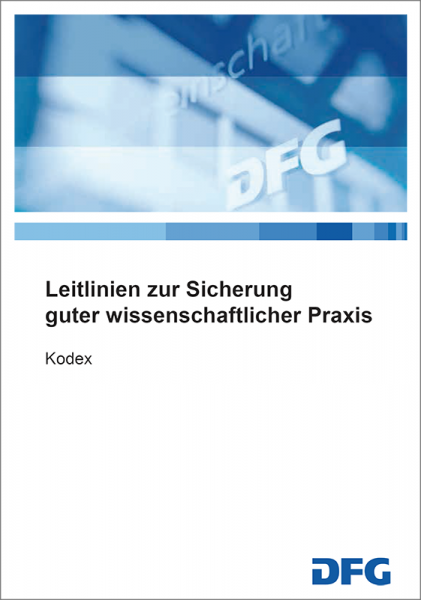New „Guidelines for Safeguarding Good Scientific Practice“ by the DFG
On July 3rd 2019, the German Research Foundation (Deutsche Forschungsgemeinschaft, DFG) released new "Guidelines for Safeguarding Good Scientific Practice" (Codex), which becomes effective on August 1st 2019. The Codex replaces the White Paper "Safeguarding Good Scientific Practice" (2013) previously in effect.
All scientists, college/university administrations and other research institutions are being addressed, enabling them to align their internal structures, processes and actions with the guidelines for ensuring good scientific practice. The goal is to establish a culture of scientific integrity in the scientific institutions, which is less concerned with violations of good scientific practice rather than with the professional ethos of the scientists.
The paper also addresses the correct handling of research data and the associated topics of data protection and (data) publication. Compared to the position paper of 2013, there are some innovations. In the new codex the DFG, for example, strongly recommends open science, ie open access publication of scientific results wherever possible, including research data. Moreover, the FAIR principles are named as the basis for dealing with research data:
"Aus Gründen der Nachvollziehbarkeit, Anschlussfähigkeit der Forschung und Nachnutzbarkeit hinterlegen Wissenschaftlerinnen und Wissenschaftler, wann immer möglich, die der Publikation zugrunde liegenden Forschungsdaten und zentralen Materialien – den FAIR-Prinzipien („Findable, Accessible, Interoperable, Re-Usable“) folgend –zugänglich in anerkannten Archiven und Repositorien."
(Leitlinie 13, Seite 19)
["For the sake of reproducability, sustainability and reusability, researchers deposit, wherever possible, the research data and core materials underlying the publication - following the FAIR principles (" Findable, Accessible, Interoperable, Reusable ") in recognized archives and repositories."]
Attention is also paid to the documentation and publication of research software, which is explicitely mentioned as equally important as other research data.
Our network contacts will be happy to answer any questions you migth have concerning the new guidelines and recommendations.

